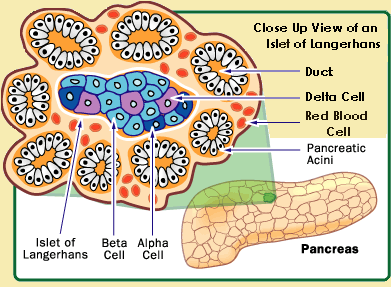Dedicated to Guna! :)
Diabetes is a chronic (long-term) disease in which a person has high blood sugar (glucose) level. High levels of glucose (a sugar) in the blood is known as hyperglycemia (hyper- meaning excessive; -glyc- meaning sweet; and -emia- meaning "of the blood").
Glucose is a simple sugar found in food. Besides that, glucose can also be obtained when carbohydrates are broken down in the small intestine. The glucose is then absorbed by the intestinal cells into the bloodstream, and is carried by the bloodstream to all the cells in the body where it is utilized.
However, glucose cannot enter the cells alone and needs insulin to aid in its transport into the cells from the bloodstream. Without insulin, the cells become starved of glucose energy despite the presence of abundant glucose in the bloodstream.
Therefore, the flow of glucose is like this: intestines--->intestinal cells--->bloodstream--->body cells.
Therefore, the flow of glucose is like this: intestines--->intestinal cells--->bloodstream--->body cells.
Insulin is a hormone produced by specific cell (beta cells) in the pancreas. While insulin has various physiological effects (causes different things to occur in the body), it ultimately results in the decrease of blood glucose levels.
This is achieved because insulin causes cells in the liver, muscle, and fat tissue to absorb glucose from the blood, storing it as glycogen in the liver and muscle, and stopping use of fat as an energy source. Insulin also decreases production of glucose from non-sugar substrates, primarily in the liver.
This is achieved because insulin causes cells in the liver, muscle, and fat tissue to absorb glucose from the blood, storing it as glycogen in the liver and muscle, and stopping use of fat as an energy source. Insulin also decreases production of glucose from non-sugar substrates, primarily in the liver.
Therefore, with this increase in the absorption of glucose from the blood into the cells and the decrease in production of glucose from non-sugar substrates by the liver, the level of glucose in the blood is effectively decreased.
*More to come later. Learn the difference between Type 1 and Type 2 Diabetes!!


4 comments:
Nice article, I write as much as I can of diabets in My blog, and I follow your blog too, my father has diabetes, and I started to take care of my health a year ago, I discovered many things and I put all in my blog http://information-about-diabetes.blogspot.com/ ,
Greetings from Peru
@CANICA: Thanks for dropping by! :)
hey, now everyone's gonna think that im having diabetes :P
@Guna: No la, u inspired me to write about this from all your questions mah...
Post a Comment